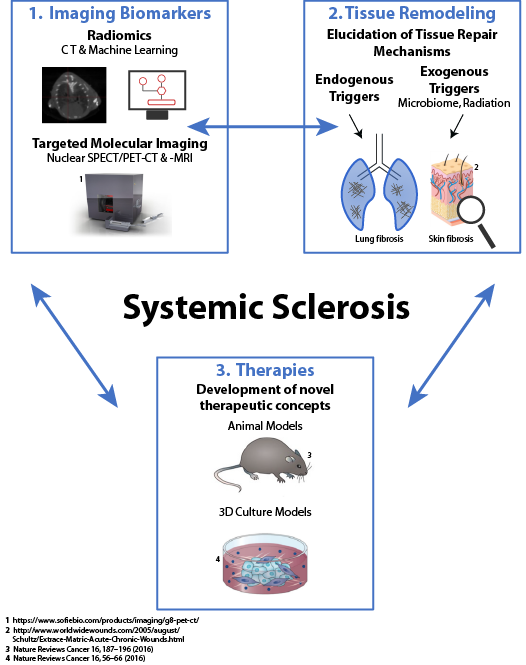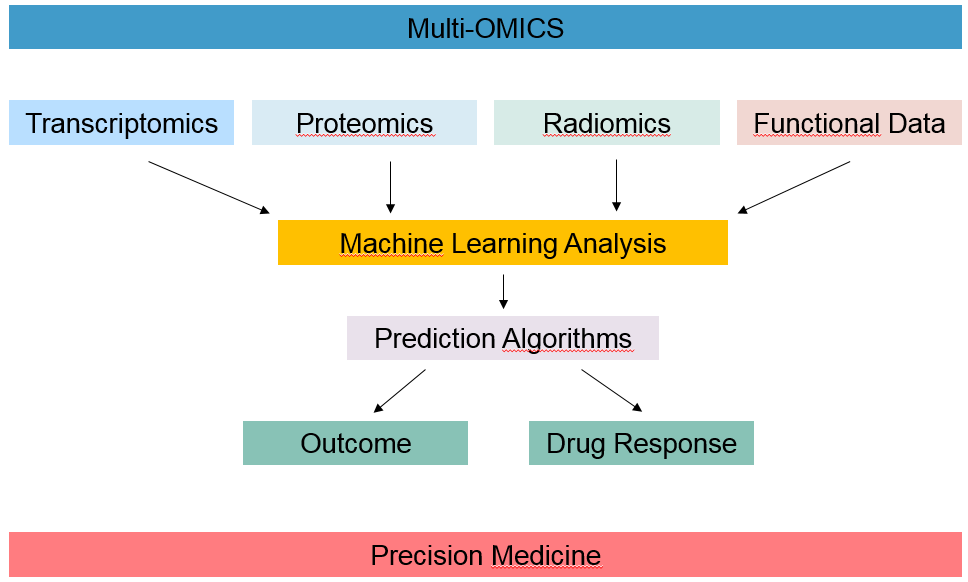Towards precision medicine in systemic sclerosis-associated intersistial lung disease
Novel imaging techniques and therapeutic aproaches.
Systemic sclerosis (SSc) is a multisystemic autoimmune disease with a mortality as high as that of untreated cancer patients. Interstitial lung disease (ILD) is one of the primary causes of death in systemic sclerosis (SSc).
The two biggest challenges for the personalized management of patients with SSc are the lack of
- sensitive diagnostic markers for outcome prediction
- targeted therapies.
We dedicate our research efforts to
-
the development of novel imaging biomarkers employing molecular targeted nuclear imaging such as PET-/SPECT-CT or -MRI, CT-based radiomics and machine learning methodologies to predict outcome and drug responses,
-
the elucidation of tissue remodeling mechanisms in the pathogenesis of SSc with special focus on environmental triggers (e.g. microbiome, radiation) and aberrant tissue repair mechanisms by using 3D cell culture models and different animal models,
-
the identification of novel therapeutic targets for the individualized treatment of lung and skin involvement in SSc.

Current Projects
Interstitial lung disease (ILD) is one of the primary causes of death in systemic sclerosis (SSc). The majority of patients identify dyspnea as a major impairment of quality of life.
Substantial insights into the underlying pathophysiology has led to the development of specific anti-inflammatory and anti-fibrotic therapeutic approaches. Thus, personalized medicine seems within reach for the individual patient. However, this is opposed by the clinical and molecular heterogeneity of the disease. Previous approaches attempting to predict individual outcome or therapeutic response, based on clinical, functional or laboratory data, have failed.
In our interdisciplinary project, we will use mouse models of SSc-ILD to generate a computer-based algorithm in a machine learning approach based on multi-omics data (transcriptomics, proteomics, radiomics, and functional data) in order to develop a prediction model. Based on a combination of variables, we envision being able to predict prognosis, drug response and monitoring.
In a second step, we will test the performance of the derived prediction algorithm in patients with SSc-ILD.

Funding sources
- Prof. Max Cloetta-Foundation
- OPO Foundation
- Gebauer Foundation
- Lung Zurich
- Swiss Lung Association
- Postdoc-Kredit UZH
- Bangerter-Foundation
- Hartmann-Mueller Foundation
